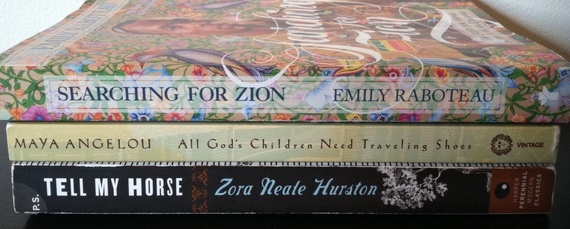Ever since I got into travel writing, I've been told to read the works of Joseph Conrad, Jack Kerouac, Edward Abbey, Bruce Chatwin, Paul Theroux, William Dalrymple, Bill Bryson, and other white men. While I learned a lot from their stories, I was also repeatedly left with questions about misogyny and racial insensitivity.
Conrad's Heart of Darkness is just brimming with racist colonial overtones. In The Great Railway Bazaar, Theroux only briefly mentions that he left a wife and kids at home before visiting an underage brothel. In On the Road, Kerouac makes it seem like abandoning your wife and kids is part of the thrill of free-spirited travel, not to mention that after briefly picking fruit in California, he decides he's part Mexican.
So I started reading women's travel writing. I was taken with Lesley Blanch's The Wilder Shores of Love, which includes an important biography of Isabel Burton (wife of the famous explorer Richard), and Aimee Crocker's And I'd Do It Again, about the heiress' independent travels in Asia. Then there's a wealth of modern-day memoirs in the vein of Tales of a Female Nomad and Eat, Pray, Love.
But where are the books by black women?
Now that the Black Travel Movement is gaining traction in the media (The New York Times recently noted the evolution of black travel), we should establish a canon of travel literature written by influential black women. These journeys can uniquely help us examine beauty, stereotypes, racial identity, neo-colonialism, diaspora, slavery, and the search for one's roots. I'd vote for these excellent books to join the must-read list:
Tell My Horse by Zora Neale Hurston
A wonderfully independent traveler, Hurston drags us deep into the supernatural side of Jamaica in the 1930s. She participates in fascinating death-related rituals, in which she learns how to interact with ghosts (and stave them off), and she tags along for several days as a band of men hunt a wild boar. Hurston then thoroughly explores voodoo in Haiti, not to mention zombies and the secret society of the Secte Rouge. She partakes in elaborate, bloody ceremonies, and throughout she offers her perspective as a black American woman amidst black and mixed Caribbean women.
All God's Children Need Traveling Shoes by Maya Angelou
In this phenomenal memoir, Angelou moves to Ghana in the 1960s and joins a community of Revolutionist Returnees, i.e. black Americans seeking their ancestral African home. Angelou is caught between her literal home in the states, where her people were treated so abhorrently, and her new home, where she isn't considered a native, and where the ghosts of her kidnapped ancestors are lurking. Having formerly worked with Martin Luther King, Angelou describes her move toward the militant Black Power movement, and she has fascinating encounters with Malcolm X in Africa. Angelou is also a single mother during this period, and a paragon of strength under pressure.
Searching for Zion by Emily Raboteau
Raboteau offers a biracial perspective on the African Diaspora and what it means to find "home." She travels to Israel, Jamaica, Ethiopia, Ghana, and the American South to conduct fascinating interviews and extensive research on Black Zionism and the meaning of Exodus, wondering just where the Promised Land might be. Like many mixed-race people, she sometimes struggles to reconcile her white and black sides, which makes her journey all the more nuanced.
Kinky Gazpacho by Lori L. Tharps
Tharps begins her story as the lone black child in her Milwaukee classroom, encountering both racism and what she calls the "Are You Black Enough?" police. After falling in love with a Spanish exchange student, Tharps turns her attention toward Spain and multi-culturalism, and in college she studies abroad in Salamanca. Over many more trips to Spain and a career in journalism, she investigates American and Spanish standards of beauty, Spanish stereotypes of black people, and Spain's history with the African slave trade.
Meeting Faith by Faith Adiele
With Nigerian and Nordic heritage, Adiele goes from the Pacific Northwest to Harvard, where academic probation then spurs her on to Thailand. There she undergoes a tremendous physical and spiritual transformation to become Thailand's first black Buddhist nun. During this unique journey, she carefully examines American and Thai standards of beauty, the expectations of women in both societies, social issues regarding black hair and dark skin, and the gender gap between Thai monks and nuns.

